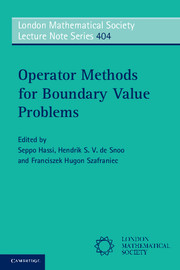Book contents
- Frontmatter
- Contents
- List of contributors
- Preface
- 1 John Williams Calkin: a short biography
- 2 On Calkin's abstract symmetric boundary conditions
- 3 Boundary triplets and maximal accretive extensions of sectorial operators
- 4 Boundary control state/signal systems and boundary triplets
- 5 Passive state/signal systems and conservative boundary relations
- 6 Elliptic operators, Dirichlet-to-Neumann maps and quasi boundary triples
- 7 Boundary triplets and Weyl functions. Recent developments
- 8 Extension theory for elliptic partial differential operators with pseudodifferential methods
- 9 Dirac structures and boundary relations
- 10 Naĭmark dilations and Naĭmark extensions in favour of moment problems
- References
7 - Boundary triplets and Weyl functions. Recent developments
Published online by Cambridge University Press: 05 November 2012
- Frontmatter
- Contents
- List of contributors
- Preface
- 1 John Williams Calkin: a short biography
- 2 On Calkin's abstract symmetric boundary conditions
- 3 Boundary triplets and maximal accretive extensions of sectorial operators
- 4 Boundary control state/signal systems and boundary triplets
- 5 Passive state/signal systems and conservative boundary relations
- 6 Elliptic operators, Dirichlet-to-Neumann maps and quasi boundary triples
- 7 Boundary triplets and Weyl functions. Recent developments
- 8 Extension theory for elliptic partial differential operators with pseudodifferential methods
- 9 Dirac structures and boundary relations
- 10 Naĭmark dilations and Naĭmark extensions in favour of moment problems
- References
Summary
Abstract Selfadjoint extensions of a closed symmetric operator in a Hilbert space with equal deficiency indices are described by means of ordinary boundary triplets. In certain problems the more general notion of a boundary triplet of bounded type is needed. It will be shown that such triplets correspond in a certain way with the, in general infinite dimensional, graph perturbations of selfadjoint operators or relations. However, when considering selfadjoint exit spaces extensions for a symmetric operator by means of the so-called Kreĭn's formula one meets the notion of boundary relation (even when the deficiency indices are finite). Whereas ordinary boundary triplets and boundary triplets of bounded type correspond to bounded unitary or unitary operators in a Kreĭn space, respectively, boundary relations correspond to general unitary relations in a Kreĭn space, which are not necessarily single-valued. It is shown that the study of isometric relations in a Kreĭn space has useful applications. This present overview of recent developments includes illustrations, for instance, by means of elliptic differential operators and Schrödinger operators with local point interactions.
Introduction
The extension theory of densely defined symmetric operators was developed in the 1930s by J. von Neumann. A complete description was given for all selfadjoint extensions in terms of the defect subspaces; see [von Neumann, 1932; Stone, 1932]. Then M.H. Stone suggested to J.W. Calkin to develop another approach based on the notion of “abstract boundary conditions”, which reduces the extension problem to a description of the hyper-maximal symmetric subspaces of some auxiliary Hilbert space.
Information
- Type
- Chapter
- Information
- Operator Methods for Boundary Value Problems , pp. 161 - 220Publisher: Cambridge University PressPrint publication year: 2012
References
Accessibility standard: Unknown
Why this information is here
This section outlines the accessibility features of this content - including support for screen readers, full keyboard navigation and high-contrast display options. This may not be relevant for you.Accessibility Information
- 8
- Cited by
